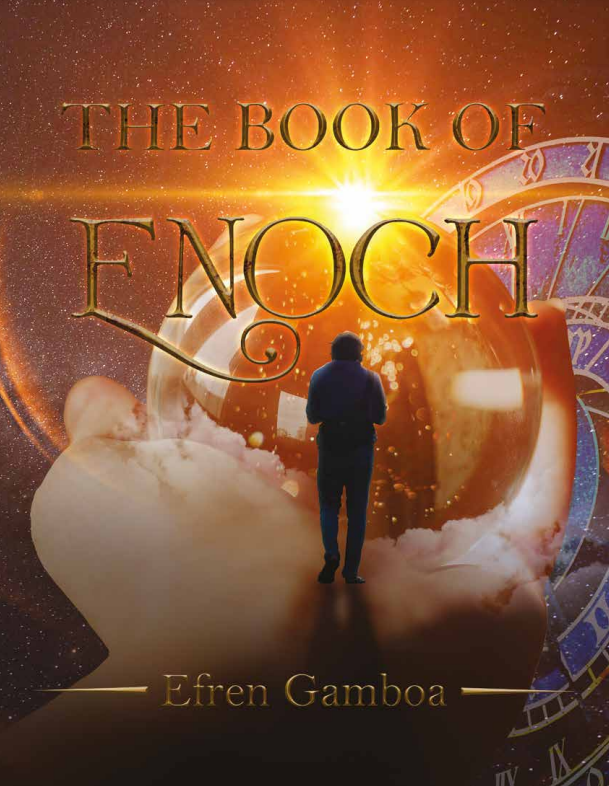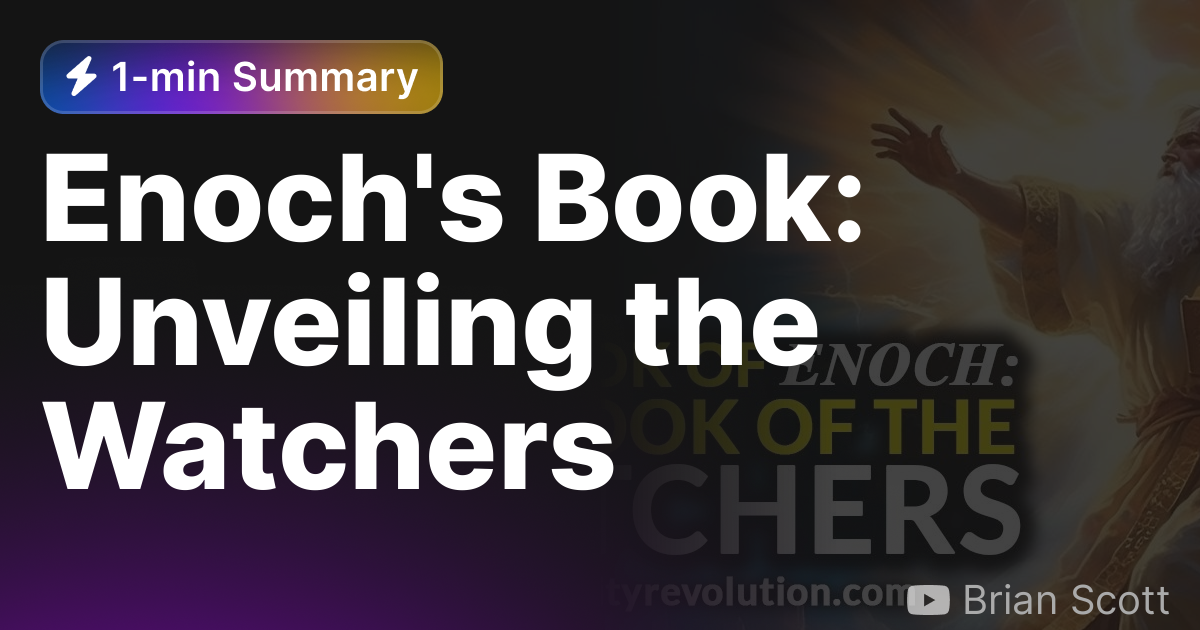The Book of Enoch is an ancient religious text that has captured the imagination of many for centuries. It tells the story of Enoch, a man who was taken up to heaven and given visions of the end times. Though not included in the biblical canon, the book is considered to be an important text by some Christians and Jews. One of the most intriguing aspects of the Book of Enoch is its description of the Watchers – a group of angels who were sent to Earth to watch over humanity, but ultimately fell from grace and brought about the downfall of mankind. In this article, we will delve into the origins, nature, and impact of the Watchers as depicted in the Book of Enoch.
Seemore: Why Stay Away from the Book of Enoch
Origin and Nature of the Watchers

The Book of Enoch does not provide a clear definition of the Watchers, but it does give us some clues as to their origin and nature. They are described as “great ones” and “holy ones”, suggesting that they were originally created as beings of great power and authority. However, they became corrupt when they disobeyed God’s commands. Additionally, the Watchers are referred to as “sons of God”, which is a term often used in the Bible to refer to angels. However, there is debate among scholars as to whether the Watchers were actually angels or some other type of celestial beings.
The Fallen Angels
The idea of fallen angels is not unique to the Book of Enoch. In fact, it can be found in various religious texts and mythologies around the world. The concept of celestial beings rebelling against their divine origins and causing chaos and destruction on Earth has long fascinated human minds. The Book of Enoch gives us a more detailed account of this fall from grace, providing names and specific sins committed by the Watchers.
The Watchers and Their Influence on Humanity
One of the main roles of the Watchers in the Book of Enoch is to watch over humanity and guide us towards righteousness. However, they failed in this responsibility when they become enamored with human women and engaged in sinful activities with them. This led to the spread of forbidden knowledge and corruption among humans, ultimately leading to the downfall of mankind.
The Sinful Activities of the Watchers

The Book of Enoch states that the primary sin of the Watchers was their interaction with humans, specifically engaging in sexual relations with human women. This is considered a betrayal of their divine duties and a violation of God’s laws. However, the book also mentions other sins committed by the Watchers, such as teaching humans about weapons, cosmetics, and astrology – all of which were considered forbidden knowledge at the time.
The Corrupting Influence of the Watchers
The influence of the Watchers on humanity is a significant theme in the Book of Enoch. Their interactions with humans not only corrupted the minds and bodies of those involved, but also introduced new concepts and technologies that were deemed destructive by God. The Watchers’ pursuit of earthly pleasures and power ultimately led to the downfall of mankind and the destruction of the world by flood.
Enslavement of Humanity
Another aspect of the Watchers’ sinful activities was their enslavement of humans. According to the Book of Enoch, the Watchers taught humans how to create and use weapons, leading to warfare and oppression of weaker individuals. This not only caused suffering for humans but also went against God’s plan for peaceful coexistence among his creations.
The Punishment of the Watchers

The Watchers’ disobedience and corrupt behavior did not go unnoticed by God. In the Book of Enoch, we see that they were punished severely for their actions. They were cast out of heaven and imprisoned in the earth, bound by chains and darkness. Some of the Watchers were also punished with eternal fire for leading humans astray.
The Fate of the Offspring
The union between the Watchers and human women resulted in the birth of a race of giants known as Nephilim. These half-human, half-angel creatures were considered abominations by God and were punished along with their fathers. The Nephilim are said to have caused great violence and destruction on Earth, further adding to the punishment of the Watchers.
The Role of Enoch in the Watcher’s Narrative
Enoch, the protagonist of the Book of Enoch, plays a pivotal role in the story of the Watchers. He is described as a righteous man who walked with God and was given visions of the end times. Enoch is one of the few humans who had direct contact with the Watchers, and he serves as a messenger and witness to their sins. It is through Enoch that we receive insight into the nature and actions of the Watchers.
Apocalyptic and Eschatological Aspects of the Watchers Story
The Book of Enoch is an apocalyptic text, meaning it focuses on the end times and the ultimate fate of humanity. The story of the Watchers is intricately connected to this theme, as their actions lead to the destruction of the world by flood. The book also contains detailed prophecies about the coming judgment and the establishment of a new kingdom of righteousness.
The Watchers as Agents of Destruction
In the Book of Enoch, the Watchers are portrayed as agents of chaos and destruction, bringing about the end of the world through their corrupting influence on humanity. Their sins and ultimate punishment serve as a warning of the consequences of disobeying God’s commands and straying from his path.
The Watchers and Redemption
Despite their grave sins, the Book of Enoch also offers a glimmer of hope for the Watchers. Enoch is said to have pleaded with God on behalf of the fallen angels, asking for mercy and forgiveness. Some interpretations suggest that the Watchers may have a chance at redemption in the end times, leading to a restoration of their heavenly status.
Comparative Analysis of the Watchers in Ancient Literature
The story of the Watchers has captured the imagination of many throughout history, and it can be found in various forms in different ancient texts. For instance, the Nephilim mentioned in the Book of Enoch are believed to be similar to the demigods in Greek mythology. The idea of celestial beings falling from grace and causing destruction on Earth can also be found in other religious and mythological traditions.
The Influence of the Book of Enoch
Despite not being included in the biblical canon, the Book of Enoch has had a significant impact on various cultures and religions. It has been referenced and alluded to in literature, art, and music throughout history. It has also influenced theological and philosophical debates around the concept of fallen angels and free will.
Satan and the Watchers
In some Christian traditions, the Watchers are associated with Satan and his fallen angels. This interpretation suggests that the Watchers were the first to rebel against God and were led by Satan, who was cast out of heaven along with them. This adds another layer of complexity to the narrative of the Watchers and their role in human history.
Theological and Ethical Implications of the Watchers Story
The story of the Watchers raises various theological and ethical questions for believers. The idea of divine beings disobeying and corrupting humanity challenges the notion of an all-powerful and benevolent God. It also poses questions about the responsibility of free will and the consequences of our actions. The punishment of the Watchers also raises questions about the nature of justice and forgiveness.
Lessons from the Watchers
The story of the Watchers serves as a cautionary tale for believers, reminding us of the consequences of straying from God’s path and the dangers of temptation. It also highlights the importance of remaining faithful to God and his commands, even in the face of adversity. The punishment of the Watchers also shows the severity of sin and the need for repentance and forgiveness.
The Enduring Legacy of the Watchers in Literature and Thought
The story of the Watchers continues to be a source of fascination and inspiration in literature and thought. From ancient texts to modern media, the concept of fallen angels and their impact on humanity has been explored and interpreted in various ways. The Book of Enoch remains a significant source of information and inspiration for those interested in the story of the Watchers and its implications.
Literature and Art
The Book of Enoch has inspired numerous works of literature and art throughout history. It has been referenced in works such as John Milton’s “Paradise Lost” and J.R.R Tolkien’s “The Silmarillion”. Artistic depictions of the Watchers can be found in various forms, from paintings and sculptures to films and television shows.
Philosophy and Theology
The story of the Watchers has also sparked philosophical and theological debates about the nature of evil, free will, and the relationship between humans and divine beings. The ethical implications of the Watchers’ actions have also been explored in depth by scholars and thinkers.
Conclusion
In conclusion, the Book of Enoch offers a unique and intriguing perspective on the story of the Watchers. Their fall from grace and the subsequent corruption of humanity serve as a cautionary tale for believers, reminding us of the consequences of straying from God’s path. The enduring legacy of the Watchers in literature and thought shows the enduring fascination with this tale of corruption and redemption. Whether seen as angels, fallen angels, or some other celestial beings, the Watchers in the Book of Enoch continue to captivate the minds and hearts of people around the world.
